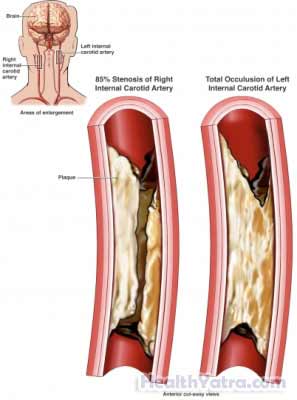تعريف
Atherosclerosis is hardening of a blood vessel from a build up of plaque. Plaque is made of fatty deposits, cholesterol, and calcium. It builds on the inside lining of arteries. This causes the artery to narrow and harden. As plaque builds up, it can slow and even stop blood flow.
Endarterectomy is a surgery to remove this build-up and improve blood flow. Surgery is most often performed on:
- Carotid arteries in the neck that supply the brain—most common use of endarterectomy
- The aorta—a major artery that runs from the heart to the abdomen
- Iliac and femoral arteries of the legs
- Renal arteries that supply the kidneys with blood

أسباب هذا الإجراء
هذا surgery is done to remove the build-up of deposits and improve blood flow. After the surgery, the symptoms of reduced blood flow, such as stroke, digestive problems, and leg cramps should improve.
المضاعفات المحتملة
If you are planning to have endarterectomy, your سيقوم الطبيب بمراجعة القائمة من المضاعفات المحتملة، والتي قد تشمل:
- نزيف
- Stroke, particularly if the carotid arteries are involved
- Blood clots
- Adverse reaction to the anesthesia
- العدوى
بعض العوامل التي قد تزيد من خطر المضاعفات تشمل:
- التدخين
- Poor overall health
- زيادة العمر
- Plaque build-up in other vessels
- Other serious diseases, such as heart failure, uncontrolled high blood pressure,diabetes, cancer, and kidney disease
تأكد من مناقشة هذه المخاطر مع طبيبك قبل الإجراء.
ما يمكن توقعه
قبل الإجراء
Before the surgery, your doctor will:
- Give you an exam to make sure that you are healthy enough for the surgery
- Order studies that show detailed images of your arteries
التحدث مع طبيبك عن الأدوية الخاصة بك. قد يطلب منك التوقف عن تناول بعض الأدوية تصل إلى أسبوع واحد قبل العملية مثل:
- الأدوية المضادة للالتهابات
- مميعات الدم
In addition, you may be instructed to:
- Avoid eating or drinking after midnight the night before the surgery.
- Arrange for a ride home from the hospital.
التخدير
You may have:
- General anesthesia —blocks any pain and keeps you asleep through the surgery; given through an IV in your hand or arm
- Local anesthesia—numbs an area of your body so that you stay awake through the surgery; may be given as an injection
وصف الإجراء
Incisions will be made over the diseased part of the artery. The location will depend on the artery that is being unblocked.
In the abdomen and legs, the doctor will clamp the artery above the obstruction during the repair. The lower half of the body can go without blood supply during the time it takes to do the surgery. If surgery is done on the neck, the blood around the surgical site may first be rerouted. This will keep blood going to the brain.
The inside of the artery will be cleaned out. Care will be taken not to have small fragments of the deposits break off and flow downstream, causing stroke or arterial occlusion. After the artery is cleaned out, the artery and the skin will be closed with sutures or staples.
كم من الوقت سيستغرق ؟
Several hours, depending on the severity of the disease
كم هو مؤلم ؟
After surgery, there will be pain from the incisions. Ask your doctor about medicine to help reduce discomfort.
متوسط الإقامة في المستشفى
This procedure is done in a hospital setting. The usual length of stay is one day to one week. Your doctor may choose to keep you longer if complications occur.
رعاية ما بعد العملية
في المستشفى
أثناء تعافيك في المستشفى ، قد تتلقى الرعاية التالية:
- You will be monitored to make sure that you are not bleeding, clotting, or developing an infection.
- You will also be monitored to make sure that your wound is healing properly and that your pain is managed.
في البيت
When you return home, do the following to help ensure a smooth recovery:
- Have your sutures or staples removed when instructed.
- If advised by your doctor, take blood thinners.
- If you had abdominal surgery, gradually resume your normal eating habits.
- للمساعدة والحد من المخاطر of plaque build-up, make changes to your diet, such as eating a diet:
- Low in الدهون المشبعة
- High in fruits and vegetables
- High in grains and fish
- If advised by your doctor, work with a nutritionist.
- اسأل طبيبك حول, عندما هي آمنة للاستحمام, السباحة, أو نقع في الماء.
- تأكد من اتباع تعليمات طبيبك.
استدعاء الطبيب
بعد مغادرة المستشفى، اتصل بطبيبك في حالة حدوث أي مما يلي:
- علامات الإصابة, بما في ذلك حمى وقشعريرة
- احمرار أو تورم أو ألم متزايد أو نزيف شديد أو أي إفرازات من موقع الشق
- الغثيان و / أو القيء الذي لا يمكنك السيطرة عليه بالأدوية التي أعطيت لك بعد الجراحة ، أو التي تستمر لأكثر من يومين بعد الخروج من المستشفى
- ألم لا يمكنك السيطرة عليه بالأدوية التي أعطيت لك
- Constipation or diarrhea
- Inability to urinate
- الدوار
- صداع شديد
- Problems with speech or vision
- سعال أو ضيق في التنفس أو ألم في الصدر
في حالة الطوارئ ، اتصل على المساعدة الطبية على الفور.
